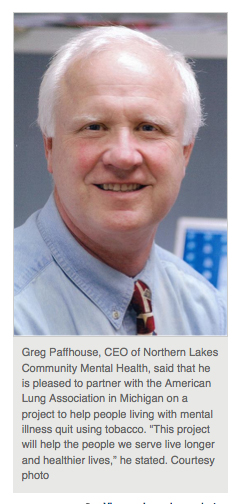Saving Lives: New project will help those with mental illness become smoke-free
Read the whole article at http://www.morningstarpublishing.com/articles/2013/12/29/grand_traverse_insiders/grand_traverse_area/doc52c098461e58b279732664.txt
Grand Traverse Insider – By KRISTINE MORRIS
 “We are very pleased to have been selected by the ALA to partner on this grant and to have been chosen as one of only five grant sites in the country,” said NLCMHA CEO Greg Paffhouse. “This project will help the people we serve live longer and healthier lives.
“We are very pleased to have been selected by the ALA to partner on this grant and to have been chosen as one of only five grant sites in the country,” said NLCMHA CEO Greg Paffhouse. “This project will help the people we serve live longer and healthier lives.
“Studies show that people with serious mental illness live 25 years less than the general population, often because of tobacco-related health problems such as heart and lung disease–problems that can be avoided or managed by quitting tobacco,” he explained.
The project’s primary goals are to train local mental health professionals to better screen for tobacco use, to support and assist persons with mental illness to stop using tobacco, and to assist NLCMHA to accomplish its vision of becoming a tobacco-free culture.
The American Lung Association (ALA) in Michigan will begin a new project to promote smoke-free living among persons with mental illness in northwest Michigan.
The effort is being made possible through a Community Transformation Grant to partner with Northern Lakes Community Mental Health (NLCMH) and other human service agency representatives from Crawford, Grand Traverse, Leelanau, Missaukee, Roscommon and Wexford counties to work on the innovative 12-month project.
The grant is one of only five such initiatives funded across the United States. More than 40 grant proposals were submitted.
“We have an obligation to assist people to make these changes, especially since persons with mental illnesses represent an estimated 44.3 percent of the United States tobacco market and are nicotine dependent at rates that are two to three times higher than the general population,” said the project’s Community Team Leader, Registered Nurse and Tobacco Addiction Specialist, Lisa Danto, who also works as coordinator of the Traverse Bay Area Tobacco Coalition.
“There are many factors for why these rates are higher, but, surprisingly, tobacco cessation efforts in this population can be effective. In fact, the percentage of people in this population who desire to quit is the same as in the general population. Our community is fortunate to have the opportunity to provide these important tobacco addiction services to such a high-risk, underserved population.”
Involving the community is a crucial part of the project’s effort. A Community Leadership Team has formed to help accomplish the project’s goals with representatives from the ALA, the Disability Network of Northern Michigan, District Health Department 10, Freed Communications, Goodwill Industries of Northern Michigan, Grand Traverse Community Collaborative, Grand Traverse County health Department, Michigan Department of Community Health Tobacco Section, Michigan Association of Community Mental Health Boards, NLCMH, Safe Harbor of Grand Traverse and the Traverse Bay Area Tobacco Coalition.
Deb Freed, of Freed Communications and part of the Community Leadership Team, has personal experience with cessation as well as with helping people with mental illness in their efforts to quit smoking. She collaborated with Danto on a grant-funded smoking cessation pilot program at NLCMH.
“As a former smoker, I know how difficult quitting can be, and how much the people served by NLCMHA want to quit,” she said. “I look forward to helping transform the public mental health system in this important way. It will definitely save lives.”
